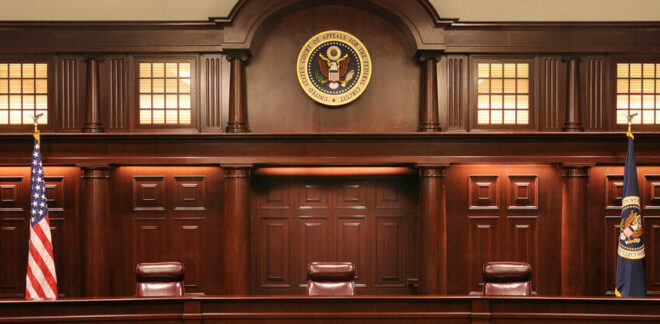“Today’s USPTO RFC poses 15 questions for public comment exploring the impact of AI on prior art, on the concept of a person having ordinary skill in the art (PHOSITA), and whether certain implications of AI require updated examination guidance or legislative changes.”
 President Biden issued an executive order (EO) on artificial intelligence on October 30, 2023, announcing a series of agency directives for managing risks related to the use of AI technologies. Now, the Department of Commerce (DOC) has announced several new actions aimed at implementing that order.
President Biden issued an executive order (EO) on artificial intelligence on October 30, 2023, announcing a series of agency directives for managing risks related to the use of AI technologies. Now, the Department of Commerce (DOC) has announced several new actions aimed at implementing that order.
On Monday, April 29, the DOC said the National Institute of Standards and Technology (NIST) has released four draft publications on improving safety and security of AI technologies and also launched a program that will help to distinguish between content produced by humans and content produced by AI. Additionally, the U.S. Patent and Trademark Office (USPTO) today published a request for comment (RFC) on “how AI could affect evaluations of how the level of ordinary skills in the arts are made to determine if an invention is patentable under U.S. law.” This follows the USPTO’s draft guidance on the patentability of AI-assisted inventions released in February of this year.
Today’s USPTO RFC poses 15 questions for public comment exploring the impact of AI on prior art, on the concept of a person having ordinary skill in the art (PHOSITA), and whether certain implications of AI require updated examination guidance or legislative changes. Comments on the RFC are due by July 29, 2024.
As to the NIST publications, AI RMF Generative AI Profile (NIST AI 600-1) is meant to help organizations identify AI-related risks and proposes mitigation actions that can be taken; Secure Software Development Practices for Generative AI and Dual-Use Foundation Models (NIST Special Publication (SP) 800-218A) addresses “concerns around malicious training data adversely affecting generative AI systems,” in onjunction with existing guidance documents; Reducing Risks Posed by Synthetic Content (NIST AI 100-4) complements a report on “understanding the provenance and detection of synthetic content” that the Biden EO tasked NIST with providing to the White House; and A Plan for Global Engagement on AI Standards (NIST AI 100-5) explores “worldwide development and implementation of AI-related consensus standards, cooperation and coordination, and information sharing.”
Comments are due on all four draft publications by June 2, 2024.
Finally, NIST GenAI is a program designed to present a series of challenge problems that will help to “evaluate and measure the capabilities and limitations of generative AI technologies.” According to the press release, one of the program’s goals is to help the public to distinguish between human and AI-generated text, images, videos and audio recordings. Registration for the program opens in May for participation in the pilot evaluation.
Biden’s October 2023 EO directed federal agencies to take a wide array of actions on AI policy. The EO’s directives for promoting innovation and competition included expanding grants for AI projects in healthcare and climate change and streamlining visa criteria to increase the highly-skilled immigrant workforce. Other sections of the EO issued directives on protecting Americans’ privacy; advancing equity and civil rights; standing up for consumers, patients and students; supporting workers; advancing American leadership abroad; and ensuring responsible and effective government use of AI.
In a statement issued with the press release yesterday, USPTO Director Kathi Vidal said “As AI assumes a larger role in innovation, we must encourage the responsible and safe use of AI to solve local and world problems and to develop the jobs and industries of the future, while ensuring AI does not derail the critical role IP plays in incentivizing human ingenuity and investment.”

![[IPWatchdog Logo]](https://ipwatchdog.com/wp-content/themes/IPWatchdog%20-%202023/assets/images/temp/logo-small@2x.png)

![[Advertisement]](https://ipwatchdog.com/wp-content/uploads/2024/05/Artificial-Intelligence-2024-Getting-AI-Patents-Allowed-sidebar-700x500-1.jpeg)
![[Advertisement]](https://ipwatchdog.com/wp-content/uploads/2024/05/Patent-Portfolio-Management-2024-sidebar-early-bird-larger-700x500-1.jpg)

![[Advertisement]](https://ipwatchdog.com/wp-content/uploads/2021/12/WEBINAR-336-x-280-px.png)
![[Advertisement]](https://ipwatchdog.com/wp-content/uploads/2021/12/2021-Patent-Practice-on-Demand-recorded-Feb-2021-336-x-280.jpg)
![[Advertisement]](https://ipwatchdog.com/wp-content/uploads/2021/12/Ad-4-The-Invent-Patent-System™.png)






Join the Discussion
3 comments so far. Add my comment.
Anon
May 1, 2024 08:50 amJulie,
Why attribute to AI what is easily explainable to the Patent Office incompetence at a general IT level?
Julie Burke
April 30, 2024 02:52 pmIs the USPTO’s Publications Department already quietly experimenting with AI?
See USPTO created technical errors in a patent publication which arises from a legacy PDF filing.
https://www.linkedin.com/posts/julie-burke-492264120_is-the-uspto-pubs-department-experimenting-activity-7191084261897068545-9PNN?utm_source=share&utm_medium=member_desktop
Anon
April 30, 2024 11:35 amIt would behoove people to revisit my comments dating back to when the DABUS case first broke upon the scene.
Apologies from my various naysayers being humbly accepted.
Add Comment